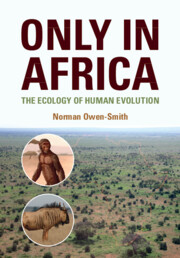Book contents
- Only in Africa
- Only in Africa
- Copyright page
- Dedication
- Contents
- Foreword
- Preface
- Abbreviations
- Part I The Physical Cradle: Land Forms, Geology, Climate, Hydrology and Soils
- Part II The Savanna Garden: Grassy Vegetation and Plant Dynamics
- Part III The Big Mammal Menagerie: Herbivores, Carnivores and Their Ecosystem Impacts
- Part IV Evolutionary Transitions: From Primate Ancestors to Modern Humans
- Chapter 15 Primate Predecessors: From Trees to Ground
- Chapter 16 Primate Ecology: From Forests into Savannas
- Chapter 17 How an Ape Became a Hunter
- Chapter 18 Cultural Evolution: From Tools to Art and Genes
- Chapter 19 Reticulate Evolution Through Turbulent Times
- Chapter 20 Prospects For a Lonely Planet
- Appendix Scientific Names of Extant Animal and Plant Species Mentioned in the Book Chapters (Ecologically Conservative with Regard to Species Recognition)
- Index
- References
Chapter 20 - Prospects For a Lonely Planet
from Part IV - Evolutionary Transitions: From Primate Ancestors to Modern Humans
Published online by Cambridge University Press: 09 September 2021
- Only in Africa
- Only in Africa
- Copyright page
- Dedication
- Contents
- Foreword
- Preface
- Abbreviations
- Part I The Physical Cradle: Land Forms, Geology, Climate, Hydrology and Soils
- Part II The Savanna Garden: Grassy Vegetation and Plant Dynamics
- Part III The Big Mammal Menagerie: Herbivores, Carnivores and Their Ecosystem Impacts
- Part IV Evolutionary Transitions: From Primate Ancestors to Modern Humans
- Chapter 15 Primate Predecessors: From Trees to Ground
- Chapter 16 Primate Ecology: From Forests into Savannas
- Chapter 17 How an Ape Became a Hunter
- Chapter 18 Cultural Evolution: From Tools to Art and Genes
- Chapter 19 Reticulate Evolution Through Turbulent Times
- Chapter 20 Prospects For a Lonely Planet
- Appendix Scientific Names of Extant Animal and Plant Species Mentioned in the Book Chapters (Ecologically Conservative with Regard to Species Recognition)
- Index
- References
Summary
Other animals have been part of our world since long before our lineage became human. We initially feared carnivores, but later boldly collected bones from the remains of their prey. Over time we developed the capacity to kill big herbivores ourselves, ultimately even those as large as elephants. Our ancestors depicted these animals on the walls of the caves and rock shelters that they occupied, both in Africa and in Europe, and wove them into folklore and ritual. Today, many people spend large sums of money to travel to places where they can still view big wild animals living under fairly natural conditions. Some of those who have become super-rich invest their wealth in buying wildlife preserves where they can retire far from city life.
- Type
- Chapter
- Information
- Only in AfricaThe Ecology of Human Evolution, pp. 340 - 343Publisher: Cambridge University PressPrint publication year: 2021

